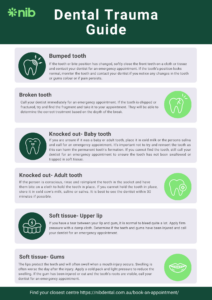Click to download your Dental Trauma Guide
We understand that accidents and emergencies can often be difficult to navigate, so we’ve created a guide for you and your family to follow when dental emergencies happen. Download and print off your Dental Trauma Guide and keep it in an accessible place for when you need it. You can keep one on your fridge and one in your sports bag for weekends.
Don’t forget, we have emergency appointments available each day.





